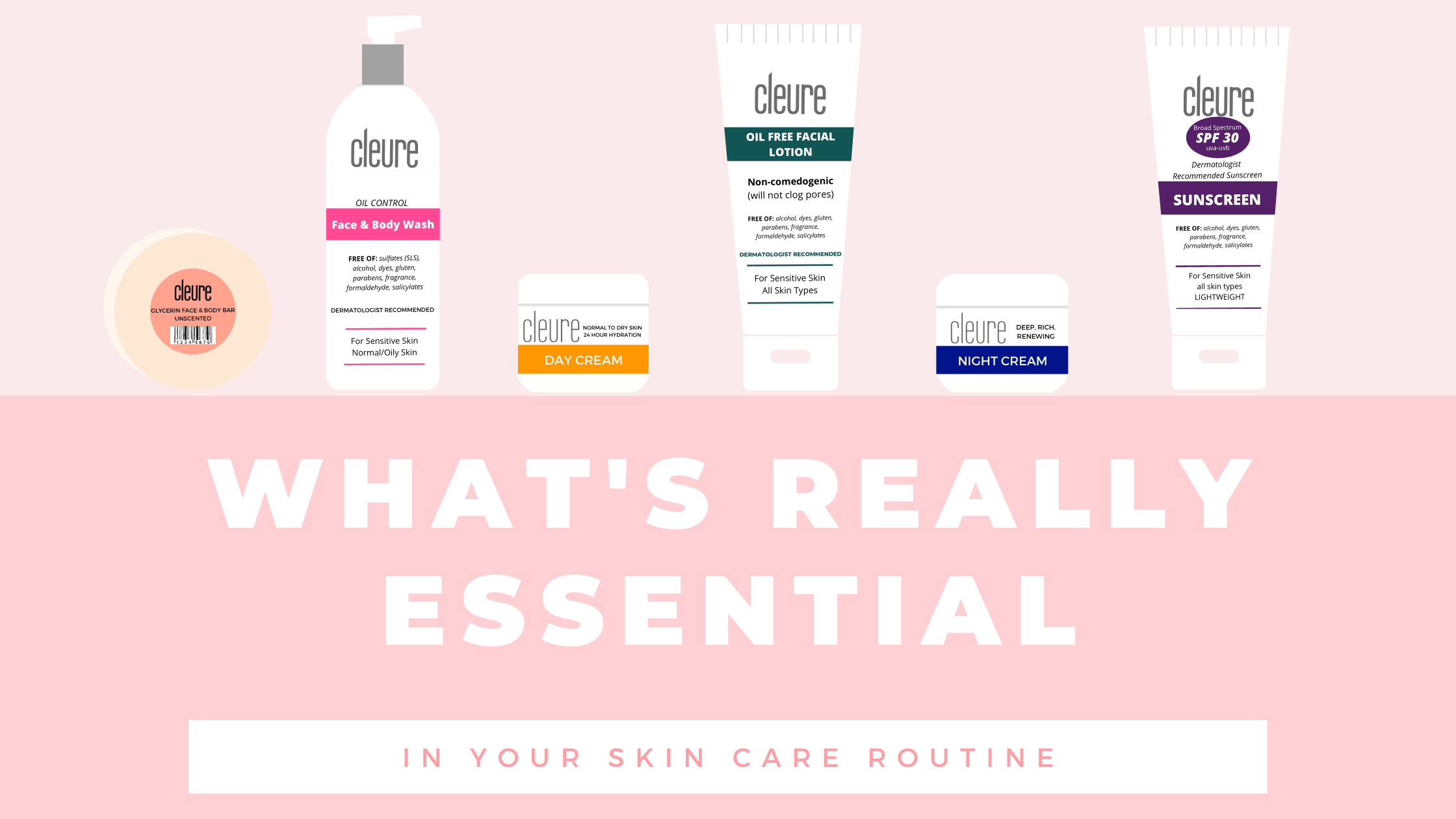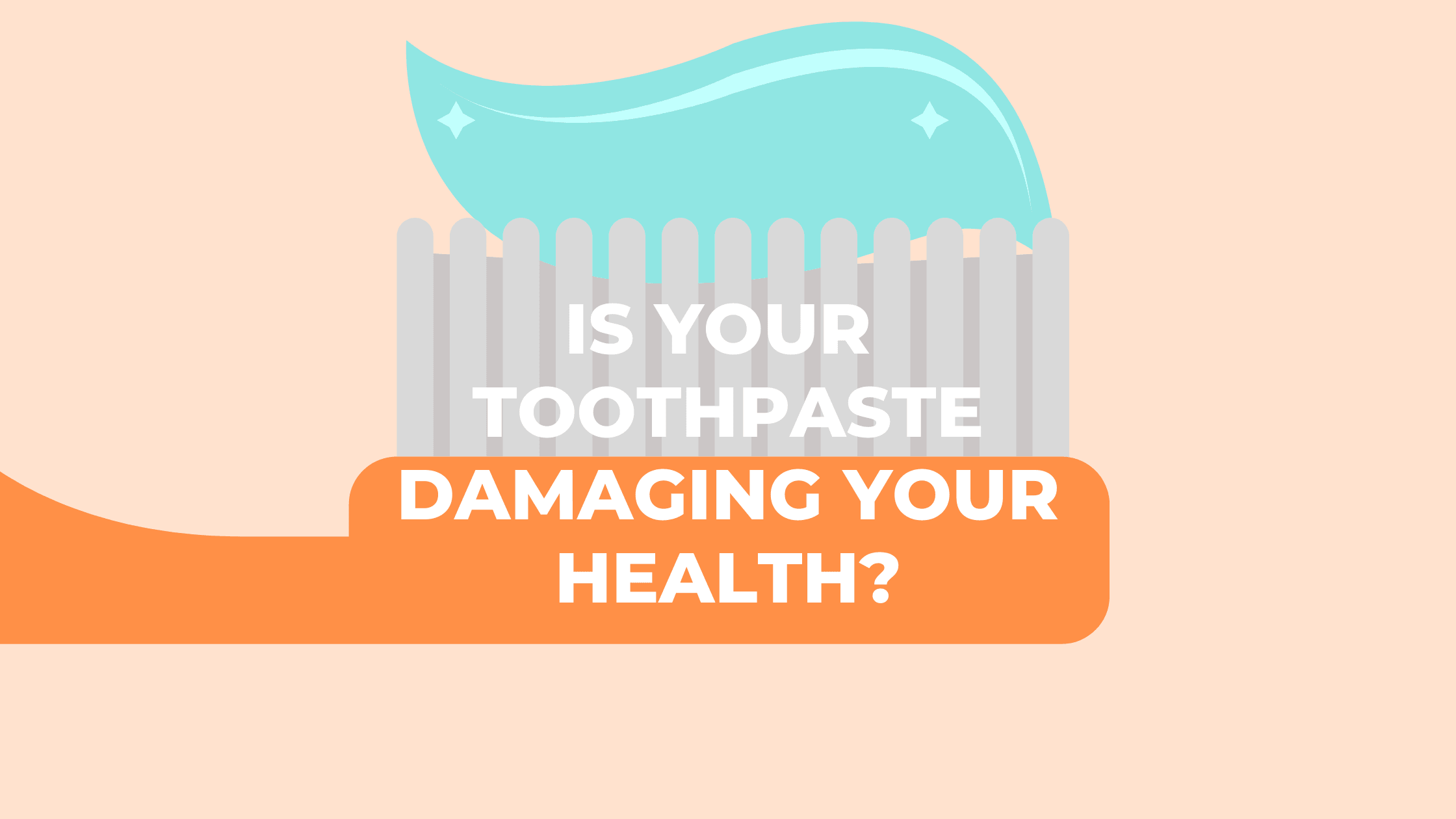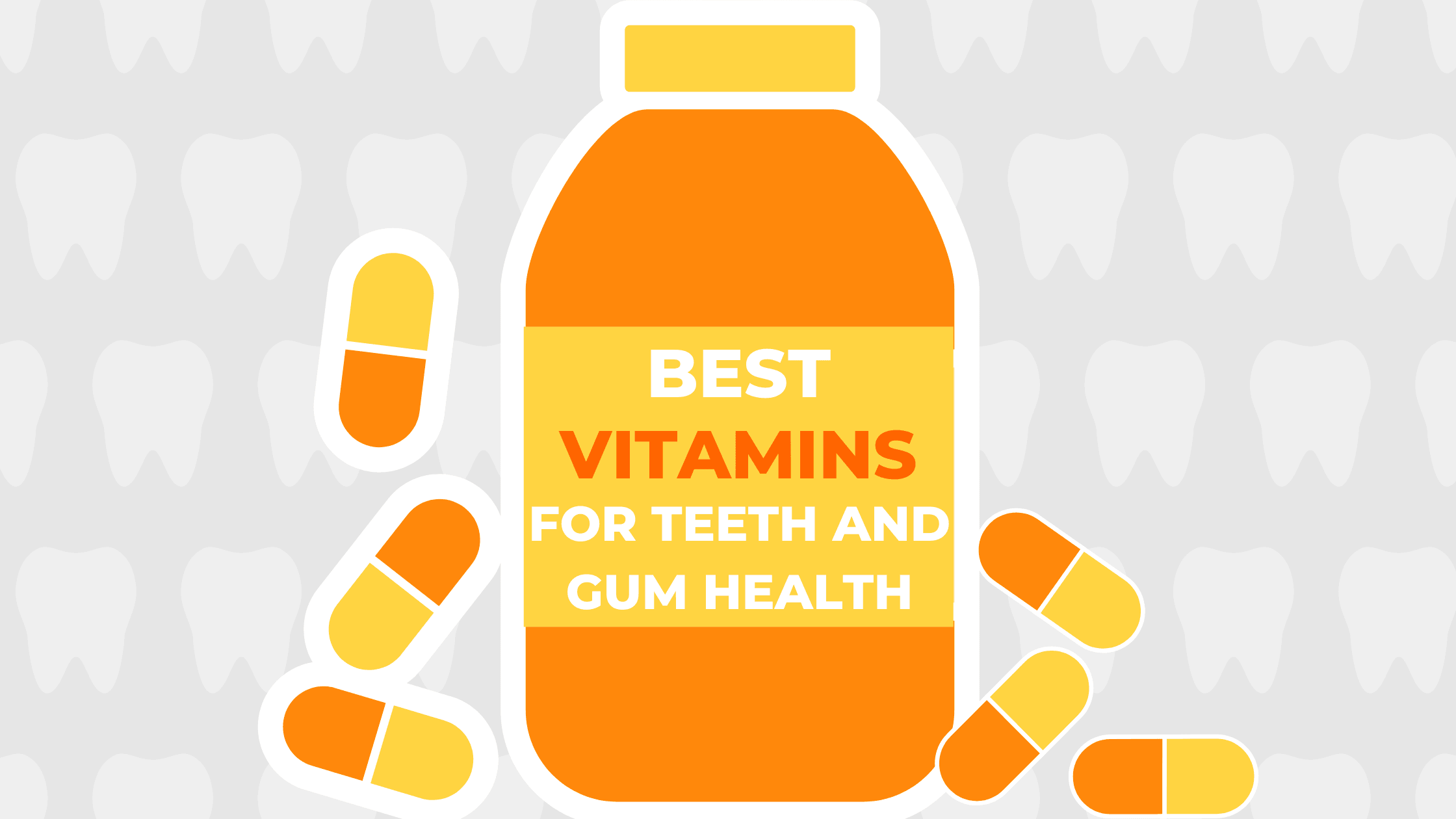
Essential Products in Your Skin Care Routine
With twelve-step skincare routines taking over the social media sphere, it can be easy to fall into the trap of buying dozens of new products in an attempt to achieve your desired clear, glowy skin. These tubes, jars, and glass dropper bottles often promise to hold the liquid gold elixir that will solve all your skin problems, but they may not actually be doing much for your skin, and if you have sensitive skin, product overload could be making your skin problems even worse.
What skincare products do you really need to use daily? Let’s spell it out.
Essential Skin Care Routine for Sensitive Skin
The three goals of your skin care routine are to cleanse, moisturizer, and protect. The only products you'll need to achieve this are a gentle cleanser, a hydrating moisturizer, and a broad spectrum sunscreen with an SPF of at least 30.
Cleanser
Everyday your skin comes into contact with makeup, dirt, and pollution and produces sebum (oil) and sweat. Not only can this lead to a greasy appearance if you have oily skin, but if you do not cleanse daily, sebum, sweat, dirt, and makeup can all build up which will result in clogged pores and breakouts.
Cleansers use detergents called "surfactants" to attract and remove this buildup. Once you clear out your pores with a cleanser the other products in your routine like your moisturizer will be able to penetrate your pores and work their magic.
If you choose a pH-balanced cleanser that is suited for your skin type, it will ensure that your skin stays around the target pH level of skin which is about 5.5. A balanced pH is key to maintaining your skin barrier which is responsible for keeping your skin hydrated and protecting against external stressors.
Read more about your skin’s pH level.
Should you double cleanse?
Double cleansing is a skin care method where you start off by using an oil based cleanser, cleansing balm, or micellar water to remove makeup and mineral sunscreen and then following up with another cleanser to deeply cleanse the pores.
This process ensures that all makeup and sunscreen is removed with the first cleanse so that the second cleanse can solely work on cleaning the pores.
However, if you have very dry skin, eczema, or rosacea, double cleansing can further dry out and irritate your skin, so stick to a single cleanse.
Moisturizer
Whenever you cleanse, you need to follow up with a moisturizer. Moisturizer is vital for locking in your skin’s essential natural oils, and restoring any moisture that may have been lost during cleansing.
Moisturizers work by increasing the water content of your skin with humectant ingredients like sodium hyaluronate and occlusive ingredients like shea butter. Humectants draw water from the deeper levels of skin to the epidermis and occlusives create a barrier that prevent that water from evaporating. The combination of the two makes for a dynamic duo in moisturizers.
If you lose moisture, your skin will dry out which can expedite the formation of fine lines and wrinkles, lead to redness and flakiness, and if you try to cover it with makeup, your foundation and concealer is more likely to look patchy and uneven.
Do you need to moisturize oily skin?
Yes! You need to moisturize your skin even if it’s oily and acne-prone. If you only cleanse and do not restore moisture afterwards, your skin will be dryer than normal and start to overcompensate by producing even more oil. This starts the chain reaction that leads to clogged pores and acne, so, regardless of your skin type, do not neglect moisturizing.
Not all moisturizers are created equal. Some moisturizers are better suited for oily skin. Use an oil-free lotion moisturizer as opposed to a thick cream moisturizer for the perfect moisture balance.
Read more on how to choose the best moisturizer for your skin type.
Sunscreen
Sunscreen is the most important step in your skin care routine hands down. It protects from sunburn, skin cancer, and premature signs of aging like wrinkles and dark spots.
According to The Skin Cancer Foundation, regular daily use of sunscreen lowers your melanoma risk by about 50 percent and your squamous cell carcinoma (SCC) risk by about 40 percent.
They recommend using a broad spectrum sunscreen (protects against both UVB and UVA rays) with an SPF of at least 15 every single day, and bumping it up to an SPF 30 sunscreen if you'll be spending a significant amount of time outside in direct sunlight.
What does the SPF number really mean? Find out here.
But what if it’s cloudy outside? You still need sunscreen. But what if I'll only be in the sun for half an hour? You still need sunscreen. But what if I’m inside all day? You still need sunscreen (unless you’re in a room with no windows). While other skin care products may be for purely aesthetic reasons, sunscreen is crucial for your health and wellness; the younger looking skin that comes with it is an added bonus.
If you oversleep and don’t have time to go through your whole skin care routine, at the very least smooth on about 1/2 teaspoon or three fingers worth of sunscreen.

Keep a spare tube in your car or purse for on-the-go application. It’ll also come in handy for reapplication since you need to reapply sunscreen every 2 hours as sunscreen protection fades over time.
Can I use an SPF moisturizer instead?
If you want to simplify your skin care routine even more, you can choose a moisturizer with an SPF in it. However, if you tend to skimp on the moisturizer, you’ll have to use more to get the full effects of your SPF. One study found that those who used an SPF moisturizer as opposed to a sunscreen were more likely to not use enough product and/or miss areas of skin like the eyelids, ears, and neck.
If you are going to swap out your sunscreen for a moisturizer with added SPF make sure to opt for one with an SPF of at least 30, use 3 fingers or 1/2 teaspoon of product, and apply it to all areas of the face and neck for adequate protection.
Health
If we’re talking about skin care essentials, we cannot neglect to mention taking care of your overall health. Your skin is your largest organ and it is the window into your body's health. Eat a nutritional diet, drink lots of water, exercise, and prioritize your mental health and stress-management. Doing so will create the basis for healthy, radiant skin.
What if I want to do more?
As you age you may want to add an anti-aging eye gel with peptides. If you deal with clogged pores and dry skin, you can add an exfoliating scrub or chemical exfoliant. If you have acne-prone skin you may want to implement a salicylic acid or benzoyl peroxide treatment. An alcohol-free toner can be helpful if your skin barrier is damaged and you need help to restore the proper pH balance.
These are all great options, but we recommend adding them into your routine one at a time to ensure that they are making a positive impact on your skin.
You also want to be careful to not use too many products that do the same thing. If you use a cleanser with salicylic acid, then you don’t need a separate salicylic acid treatment and if you choose to moisturize using a day cream with Vitamin C, then you don’t necessarily need a separate vitamin C serum.
Generally speaking, less is more for your skin care. Once you’ve found the bare necessities for your skin, you can add some additional steps to supplement your individual skin care needs. But first, try a more minimalist skin care routine for a few weeks, and add more targeted products if you and your dermatologist feel it's necessary.
Simplify Your Skin Care
Using too many skin care products can irritate your skin especially if you have sensitive skin. If you're searching for the solution for all of your skin's problems in creams, serums, and oils, you may be moving in the wrong direction. Instead of adding to your routine, subtract anything that isn't one of these 3 essentials. You may be surprised at how well your skin reacts.
More Information
- Do You Really Need a Skin Care Routine - Northwestern Medicine
- Skin Care Tips Dermatologists Use - American Academy of Dermatology
- All About Sunscreen - The Skin Cancer Foundation
- The Role of Moisturizers in Addressing Various Kinds of Dermatitis: A Review - US National Library of Medicine



Leave a comment
This site is protected by hCaptcha and the hCaptcha Privacy Policy and Terms of Service apply.